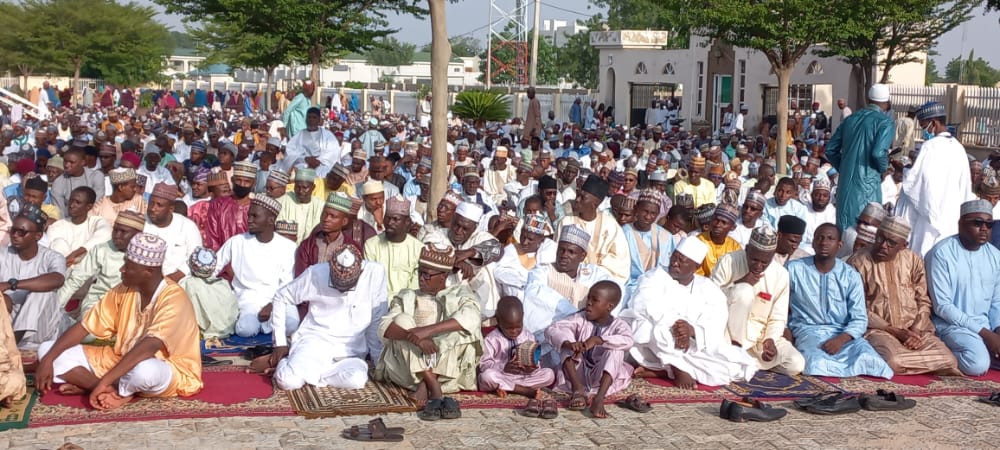Lessons from Eid el Kabir
Saturday, July 9, 2022, was Eid el Kabir (or Big Sallah) in Nigeria. It is also called “Eid el Ad-ha”, meaning the “Festival of Sacrifice”. Following the announcement by the Sultan of Sokoto and President of the Nigeria Supreme Council for Islamic Affairs, Alhaji Muhammadu Sa’ad Abubakar, which declared Thursday, June 30, 2022, as the […]

Saturday, July 9, 2022, was Eid el Kabir (or Big Sallah) in Nigeria. It is also called “Eid el Ad-ha”, meaning the “Festival of Sacrifice”. Following the announcement by the Sultan of Sokoto and President of the Nigeria Supreme Council for Islamic Affairs, Alhaji Muhammadu Sa’ad Abubakar, which declared Thursday, June 30, 2022, as the first day of the Islamic lunar month of Dhul-Hijjah 1443 After Hijrah; Muslims in Nigeria joined their counterparts in other parts of the world to observe the event last Saturday, which was the 10th day of Dhul-Hijjah. A day earlier, Friday, July 8, 2022, was Arafat day when millions of pilgrims converged at the plains of mount Arafat; marking the climax of the hajj rites.
Dhul-Hijjah is an annual Islamic event during which Muslims offer animal sacrifices to commemorate the initial sacrifice made by Prophet Ibrahim (AS) who saw a vision in which he was divinely commanded by Allah to offer his only son then, Ismail, as a sacrifice. The son respectfully consented to the wish of his father, which was inspired by Allah’s command. When Ibrahim (AS) laid his son prostrate on his forehead in readiness for the sacrifice, the son was ransomed by Allah with a ram. This, in essence, is the height of patience and submission in which both Ibrahim (AS) and his son, Ismail (AS) cheerfully offered to suffer self-sacrifice in order to obey Allah’s divine command. Since then, it became a rite for Muslims who possess the means to offer sacrifices, annually, on the 10th day of the Islamic lunar month of Dhul-Hijjah.
The essential message in this annual religious rite of sacrifice is symbolised by Prophet Ibrahim (AS)’s persevering patience and Ismail (AS)’s obedience. Sincere sacrifice as demonstrated by Ismail begins with obedience to divine commandments and to the commands of those charged with authority among us. Obedience to Allah, parents and constituted authorities is, therefore, an expression of, and indeed, an assured path to genuine sacrifices. More importantly, no act of sacrifice goes unrewarded in the sight of Allah.
Sacrifice, which nonetheless encompasses service to humanity, goes beyond animal sacrifices on the occasion of Eid. It also includes giving out our time, physical strength or wealth for the benefit of our country. It equally includes any other intangible sacrifices that could be offered for the development of the society. Credible leadership achieved through selfless service is a manifestation of sincere sacrifice. Selfless service provided for the common good of the people is essentially a reflection of genuine sacrifice. Where greed such as the excessive type common among Nigerians is a norm, the intent to make sacrifices may never go beyond wishful thinking.
Most often, bad governance is a consequence of the failure of leaders to make sacrifices. Greed has always remained a huge obstacle to sacrifice. Personal sacrifices of persons in positions of authority beget credible governance. Leadership founded on an altruistic sense of responsibility and guided by modesty, transparent honesty, justice is generally fundamental to any sacrifices a leader may wish to offer. This is one virtue that is, today, missing in the character of many public officers in leadership positions in Nigeria. To bring Nigeria out of the socio-economic mess and political misfortune in which bad governance has plunged it, we encourage leaders, elected and appointed, to imbibe the obliging kind of submission exhibited by Ismail (AS). Sacrifices by leaders are meant to inspire those they lead to also make patriotic sacrifices including paying the supreme price, which Ismail was prepared to make.
This is why we urge Muslims not to denigrate their leaders but pray to Allah to give them the wisdom and the capacity needed to overcome the country’s challenges, especially insecurity. However, leaders are expected to be regularly sensitive to the genuine feelings of those they lead. Politicians and political office holders in the country must resolve to eschew the deepening culture of impunity that is misleading young people. We also urge the government to make concrete efforts at tackling poverty and unemployment and to reduce the hardship faced by majority of Nigerians.
Yet, the government needs to be more proactive in tackling banditry, kidnapping and terrorist activities. The military and other security operatives must stop treating criminal elements with kid gloves. To bring the perpetual agony and trauma experienced by Nigerians to an end, the armed forces should strategically and logistically be forthcoming in confronting the threats posed by armed bandits and terrorists. In the spirit of this season, we encourage aggrieved persons and groups in the country to abandon violence and seek redress through non-violent means. Violence, which destroys, is not the best way to express ill feelings.
Muslims who are able to make animal sacrifices are encouraged to extend their generous hands of alms to their neighbours and the less-privileged members of their immediate community. The occasion of the Eid should be explored to further religious understanding and national cohesion. We call on Muslims to, during this holy season, include Nigeria in their prayers; pleading with God to bring all the critical security and economic challenges currently confronting the country to a quick end.
Daily Trust wishes all Nigerians Happy Sallah!
